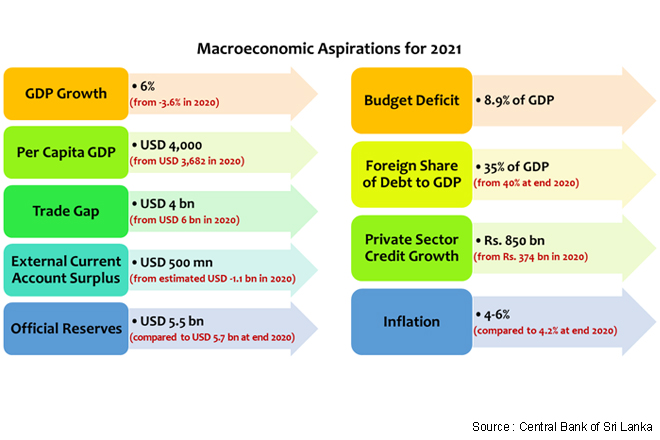Sri Lanka's Central Bank says that the economy is steadily progressing as displayed in the latest economic indicators even though the second wave of COVID 19 posed a setback.
Releasing a slideshow with the latest economic indicators, the Bank said that enhanced foreign exchange earnings and increased investment inflows are expected to assist Sri Lanka in reducing its dependence on external debt and improve macroeconomic resilience.
Latest Economic Indicators:
- In 2020, the performance of the Sri Lankan economy beat expectations of multilateral agencies
- COVID 19 pandemic has been contained to a large extent, and the local immunisation drive is continuing
- The country is experiencing the third consecutive year of bumper paddy harvest
- Tea production has returned to the levels observed in 2019
- Rubber production is on an upward trend
- Coconut production has recovered to a great extent
- Power generation has normalised
- Data usage has shown strong growth, highlighting the continuity of economic activity through online platforms and work from home arrangements
- Local cement production has shown strong growth, depicting positive sentiments in the sector
- Industrial production has reached pre-pandemic levels
- Purchasing managers’ indices show positive sentiments across manufacturing and services
- Export earnings recovered, while imports remained subdued
- Accordingly, the trade deficit narrowed
- A notable rebound in workers’ remittances was observed
- IT/BPO sector performed notably in 2020
- After several months, Sri Lanka recommenced welcoming tourists. A rebound is expected, particularly in the second half of the year
- Amidst headwinds, the external current account deficit improved
- Despite the setback in 2020, a strong pipeline of FDI inflows awaits, particularly with the introduction of the Colombo Port City Commission law
- Recent policy measures have enabled a gradual absorption of forex related to workers’ remittances and exports proceeds, towards building forex reserves
- Debt servicing obligations were duly met, dispelling adverse speculation and uncertainties caused by the unwarranted sovereign rating downgrades
- The Colombo Stock Exchange displayed its potential
- Business confidence has returned
- Share of foreign debt of the Government has declined notably
- Given subdued levels of inflation and inflation expectations, the Central Bank conducted monetary policy with a focus on supporting the economic recovery
- Monetary policy easing measures have resulted in historically low-interest rates, thereby passing the benefit of low inflation to entrepreneurs
- Credit to the private sector is expanding
- Expansionary policies have been supported by well-managed inflation and inflation expectations
- The novel economic model of the Government is focused on strengthening macroeconomic fundamentals
- Macroeconomic aspirations for 2021 are backed by concerted efforts to enhance non-debt creating foreign exchange inflows
- The realisation of these aspirations are monitored regularly, and impediments and bottlenecks addressed
- Enhanced foreign exchange earnings and increased investment inflows are expected to assist SRI LANKA in reducing its dependence on external debt and improve macroeconomic resilience
The Central Bank expects these, along with supportive economic policies and necessary reforms towards improving the doing business environment, will help the country to return to a high growth path in 2021 and beyond.
Loading...

